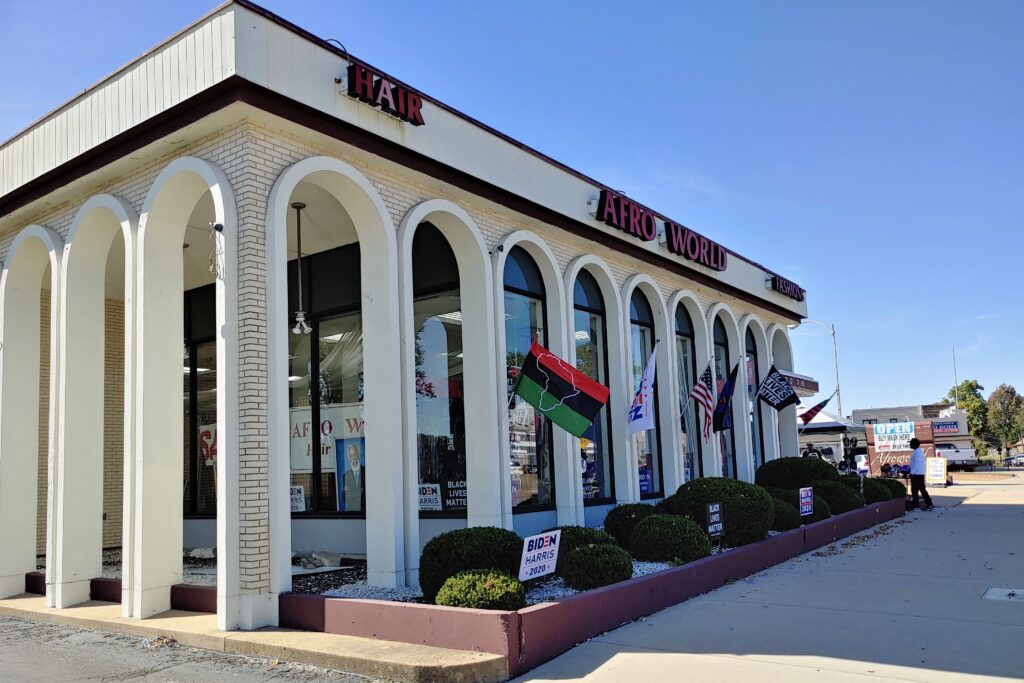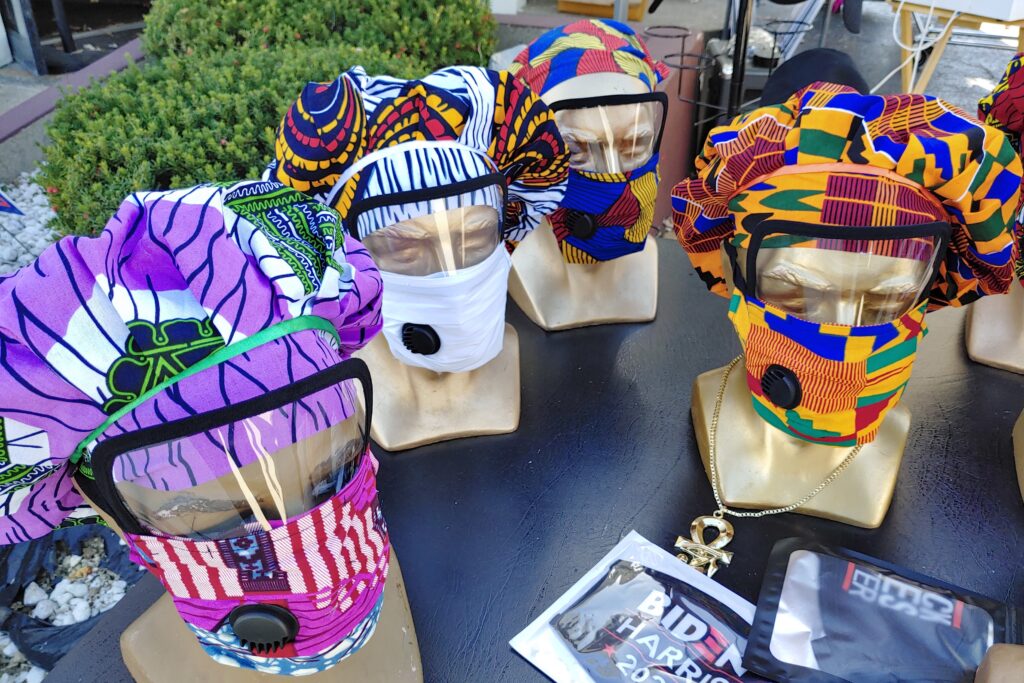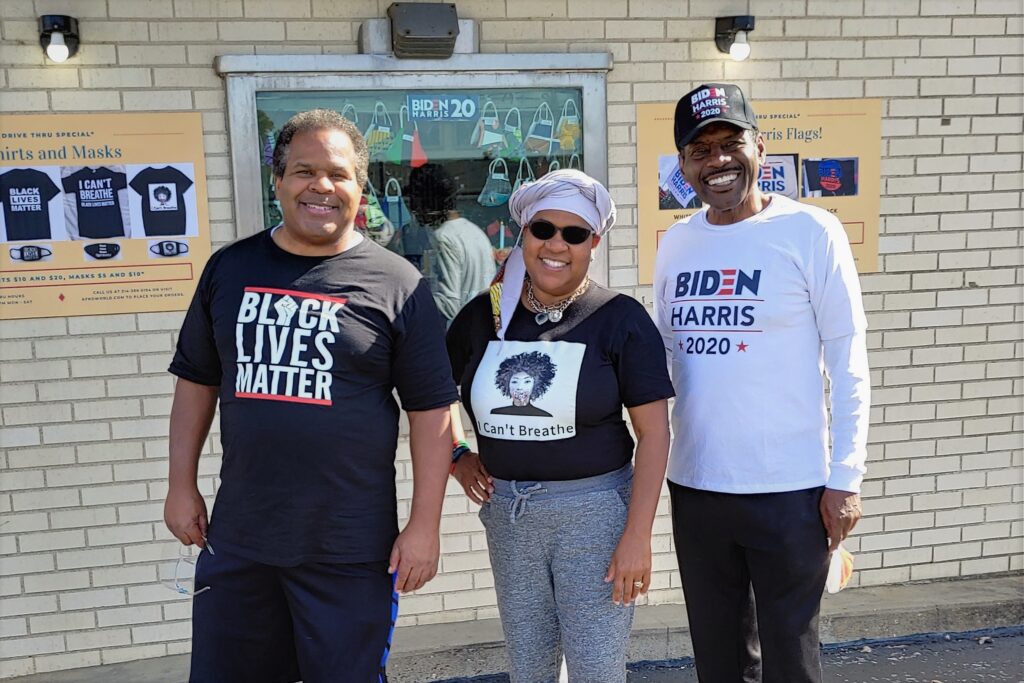Afro World Hair and Fashion Co. in North St. Louis County began as a mail-order hair business in the 1970s. Today, it has grown to be a community hub of cultural pride.
The doors at 7276 Natural Bridge Road are closed during the COVID-19 pandemic, but they have kept going with a drive-up window, tent, and online presence. Unfortunately, you won’t be able to see the many portraits of African-American heroes and entertainers—and Elvis—inside until they reopen.
The business has been in the Little family for 50 years and is currently operated by three siblings: CEO Sheila Little-Forrest, MBA, runs the day-to-day operations; Russ, Jr., specializes in technical support and shipping; and Victor focuses on the product line.
Hair
In 1970, Russ Little, Sr., was a 30-year-old father working for IBM as a computer engineer and watching his hair recede. Finding a respectable toupee for African American men at that time was a challenge and you could spot them from across the street. “They were basically White men’s toupees that they would scruff up a little bit,” Victor says.
Russ Sr. invented a toupee hair texture that was more compatible to African American men and started Afro World as a hair replacement business.

As with many startups, the business began in the home. Victor says, “We grew up hearing the phone ringing and knew that when our particular red phone—our hotline—rang, that meant that that was an order.” Afro World maintained a strong mail-order business supplying hair for weaving and braiding during the 1970s and 1980s when large afros and long hair were popular. In the late 1980s, Asian hair suppliers opened shops, cornering the market. Russ Sr. reached retirement and told his children they would need to come up with a new product line to stay in business.
Fashion
While Victor was in Los Angeles for a disappointing hair trade show in 1990, Renita Benson, a hairdresser and great friend of his who had a shop across the street from Afro World, asked him to tag along with her to the fashion district to buy clothes she sold on the side. Though he had no intention of buying anything, he enjoyed watching her carefully pick out clothes for her female clients. He took the few thousand dollars he had from sales at the trade show and bought some dresses.
Victor had answered his father’s direction to find a new industry. “I came back from the hair show so geeked and so excited,” Victor says. When his family asked for the money from the show, he told them, “Have I got news for you. I don’t have any money, but what I do have is dresses!” That did not go over well. His father would not speak with him, and Victor felt deflated.
However, he put the clothes on a rack in the center of the store. Soon, women who were coming in for hair started to pay attention, word travelled across families and communities, and the Afro World fashion business exploded. It has been around longer now as a fashion/hair business than just a hair business. Victor found new joy in discovering styles for women, including the many women in his family. He says, “When you find that right look, it don’t matter how much it costs. It don’t matter where it’s at. If that’s her look, she’s going to get that.” Victor is careful to avoid two people wearing the same outfit to an event—he only keeps a few items of each unique piece in stock. However, that often means items sell before he even gets a chance to post them online. When it comes to risk, Victor says, “You listen to too many people, and they’ll stop you cold from doing anything.”
Community and Safety
Victor credits Sheila for Afro World’s reputation. He says, “It’s because of her determination and her love for the community.” The store has community resource information on hand and, prior to the pandemic, often cleared space inside for events—free to attend with a request for a canned good donation. Authors, performers, and visual artists—such as St. Louis artist Cbabi Bayoc—have appeared there. It has held events related to racial injustice for Black History Month, featuring lecturers and documentaries. For 25 years, they have held a pre-Mother’s Day fashion show, Hattitudes, featuring hats by Harriet Rosebud.
The parking lot was recently the site of voter registration events for several weeks, featuring drummers, socially distanced dancing, and political leaders. Sheila was particularly excited for first-time voters, with Victor adding, “Some of the people were 35 years old!”
Victor says Afro World’s success is a result of nurturing relationships with vendors, employees, and customers. Entrepreneurs are welcome to sell their product inside the store. He thinks small businesses could do a better job of working together and supporting new local business.

When the pandemic forced Sheila to let go of employees, Victor and Russ Jr. stepped in to help. On a pleasant day, you can find all three Littles in the parking lot under a tent, selling Africa-inspired masks with an optional eye shield, jewelry, dashikis, and more. On other days, Afro World sells items safely using its drive-up window, a remnant of its former days as a bank. In the past, the window was used for discrete toupee purchases.
Staying safe is very important to a family business, as it only takes one person getting sick to wipe out the rest. When asked what they plan to do in the future, Victor says, “We’re doing it based on the science. It’s the most intelligent way to deal with life right now.”
